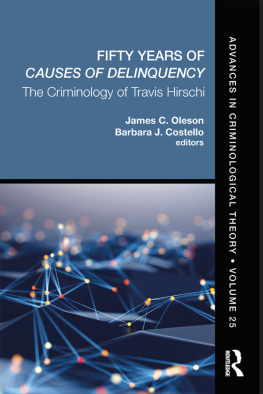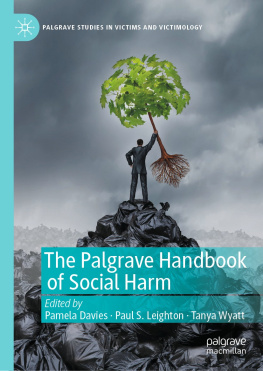CONTEMPORARY CRIMINOLOGICAL ISSUES
The University of Ottawa Press (UOP) is proud to be the oldest of the francophone university presses in Canada as well as the oldest bilingual university publisher in North America. Since 1936, UOP has been enriching intellectual and cultural discourse by producing peer-reviewed and award-winning books in the humanities and social sciences, in French and in English.
www.press.uottawa.ca
Library and Archives Canada Cataloguing in Publication
Title: Contemporary criminological issues : moving beyond insecurity and exclusion / editors: Carolyn Ct-Lussier, David Moffette, Justin Pich.
Names: Ct-Lussier, Carolyn, 1983- editor. | Moffette, David, 1981- editor. | Pich, Justin, editor.
Description: English tome. | Includes bibliographical references.
Identifiers: Canadiana (print) 20200192809 | Canadiana (ebook) 20200193007 | ISBN 9780776628707 (softcover) | ISBN 9780776629919 (hardcover) | ISBN 9780776628714 (PDF) | ISBN 9780776628721 (EPUB) | ISBN 9780776628738 (Kindle)
Subjects: LCSH: Critical criminology. | LCSH: CrimeSociological aspects.
Classification: LCC HV6019 .C66 2020 | DDC 364dc23
Legal Deposit: Second Quarter 2020 Library and Archives Canada Printed in Canada Production Team Copy editing
Proofreading
Typesetting
Cover design
Cover image | Alicia Peres
Michael Waldin
Nord Compo
Steve Kress
Little birds escape out of birdcage, freedom concept, by frankie's |
This book was published with the help of a grant from the Canadian Federation for the Humanities and Social Sciences, through the Awards to Scholarly Publications Program, using funds provided by the Social Sciences and Humanities Research Council of Canada. | Carolyn Ct-Lussier, David Moffette and Justin Pich, 2020 Attribution-Non-Commercial-Share Alike 4.0 International (CC BY-NC-ND 4.0) By virtue of this licence, you are free to:
Sharecopy and redistribute the material in any medium or format Under the following terms: AttributionYou must give appropriate credit, provide a link to the licence, and indicate if changes were made. You may do so in any reasonable manner, but not in any way that suggests the licensor endorses you or your use. Non-CommercialYou may not use the material for commercial purposes. No DerivativesIf you remix, transform, or build upon the material, you may not distribute the modified material. No additional restrictionsYou may not apply legal terms or technological measures that legally restrict others from doing anything the licence permits. |
The University of Ottawa Press gratefully acknowledges the support extended to its publishing list by the Government of Canada, the Canada Council for the Arts, the Ontario Arts Council, the Social Sciences and Humanities Research Council and the Canadian Federation for the Humanities and Social Sciences through the Awards to Scholarly Publications Program, and by the University of Ottawa.
Table of Contents
Carolyn Ct-Lussier, David Moffette, and Justin Pich
David Moffette and Anna Pratt
Matthew Ferguson, Justin Pich, Gwnola Ricordeau, Carolina S. Boe, and Kevin Walby
Maritza Felices-Luna and Anouk Guin
Jennifer M. Kilty, Sandra Lehalle, and Rachel Fayter
Christine Gervais, Matthew S. Johnston, Serenna Dastouri, Leslie McGowran, and Elisa Romano
Kathryn M. Campbell and Stephanie Wellman
Baljit Nagra and Jeffrey Monaghan
Tuulia Law, Brittany Mario, and Chris Bruckert
Christopher Greco and Patrice Corriveau
Carolyn Ct-Lussier, Katrin Hohl, and Jean-Denis David
Irvin Waller, Vernica Martnez, Audrey Monette, and Jeffrey Bradley
Gillian Balfour (class of 87 and 94)
T his edited collection, which features both an English and a French volume, was assembled to mark the 50th anniversary of the Department of Criminology at the University of Ottawa in 2018. The project is the result of a collective process and support from many colleagues along the way, whom we would like to take the opportunity to thank.
Contributors to this edited collection were invited to present their chapters at a bilingual conference that was simultaneously translated, which we organized during the week-long celebrations of the anniversary. The discussions emanating from the conference helped further shape the content of the books. We thank the contributors, along with Anthony Doob (University of Toronto) who gave the opening remarks of this conference, and Gillian Balfour (Trent University) and Joane Martel (Universit Laval) who gave the concluding remarks, for participating in this memorable event. We also thank the student volunteers (Anne Goodall, Alyssa Leblond, Joseph-Christopher Murat, Karley Carvalho, Kevin Hibbert, Maria Silva Roy, Katarina Bogosavljevic, and Rene Komel) and other members of the Criminology Graduate Students Association for their role in ensuring the conference ran smoothly.
This edited collection and the event connected to it would not have been possible without the many departmental colleagues who helped us organize the 50th anniversary celebrations, notably Carmella Gehrels, Stephanie Tavares, France Dompierre, Genevive Nault, Kathryn Campbell, Sylvie Frigon, Jennifer Kilty, and Michael Kempa. This event also received support colleagues from the Faculty of Social Sciences, including Ouida Loeffelholtz, Marie-Anne Burgess, Sophie Mathiaut, Marianne Saikeley, Victoria Barnham, Sophie Letouz, John Sylvestre, JoAnne St.-Gelais, and Maurice Lvesque. Other members of the University of Ottawa communityincluding Hillary Rose, Lucie Gendron, Natasha Paquet-Lavoie, Karine Charron, and Marianne Soucyalso made important contributions. We thank all of them for their efforts.
At the University of Ottawa Press, we had the pleasure of working with an efficient, dedicated and supportive team comprised of Caroline Boudreau, Lara Mainville, Elizabeth Schwaiger, Franois Lavigne, Vashini Jaunky, Maryse Cloutier, and Alicia Peres. We thank them, along with the two anonymous peer reviewers of each of the two volumes, for their constructive and useful feedback.
Lastly, we wish to acknowledge that the Social Sciences and Humanities Research Council of Canada, the Federation for the Humanities and Social Sciences, the Department of Criminology, and the Faculty of Social Sciences at the University of Ottawa who all helped fund this project, which we hope will help shape critical criminology in Canada and elsewhere in the years to come.









